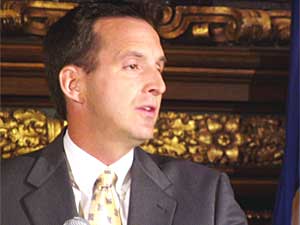|
Photos
More from MPR
Resources
Your Voice
|
Governor moves to link driver's license to school attendance
September 7, 2004
 |
| Gov. Pawlenty says his administration will put a truancy prevention plan into effect on its own, even though the Legislature failed to approve the plan in the last session. (MPR Photo/Michael Khoo) |
St. Paul, Minn. — Unexcused absences earned this school year could come back to haunt students who apply for a state driver's license next spring. Gov. Pawlenty's plan would deny driving privileges to 16- or 17-year-olds who are classified as "habitually truant," meaning they've had seven or more unexcused classroom absences in a school year.
Pawlenty made a similar proposal a year ago, but the plan floundered in this year's gridlocked legislative session. Pawlenty says, as a result, he's decided to take action administratively.
"Students who don't attend school regularly don't learn, and they don't ultimately succeed academically," says Pawlenty. "There's also studies that indicate that habitual truancy leads to all sorts of other problems in life, including greater propensity towards crime."
 | |||
Unlike the original plan, the governor's initiative would only deny driver's licenses to new applicants. The state would have no authority to revoke approved licenses for subsequent truancies. But that could change if lawmakers decide next year to give Pawlenty that authority.
Sen. Geoff Michel, R-Edina, says driving privileges are a powerful incentive to the teenage crowd.
"As the father of four daughters, I know how hard it is for a parent to get the attention of these kids. And so what this does is it raises the flag -- and lets parents and Minnesotans raise the flag -- saying that attendance matters," says Michel. "And it really captures the attention of kids who really, really look forward to the privilege of driving."
The plan also received positive reviews from several school administrators and law enforcement officials. Charlie Kyte is the executive director for the Minnesota Association of School Administrators. Kyte, who was on hand for the governor's announcement, says he's heard encouraging anecdotal reports from other states that have tried some form of Pawlenty's approach.
|
It raises the flag ... saying that attendance matters. And it really captures the attention of kids who really, really look forward to the privilege of driving.
- Sen. Geoff Michel, R-Edina |
"The state of Minnesota spends a lot of money to educate the kids of Minnesota. Teachers are in the classrooms wanting to teach them. We need the students there. This will have an effect, we believe, from the fifth grade on up, having kids be in school more regularly," says Kyte.
Critics, however, say the governor is taking aim at the wrong target. Sen. Steve Kelley, DFL-Hopkins, the chair of the Senate Education Committee, says he understands the need to lower truancy and dropout rates. But he says tying school attendance to driving privileges may be ineffective for at-risk low-income students, who may not have access to a car in the first place. Kelley says students and teachers need stronger curricula and better funding.
"We know that for kids that are behind or kids that we need to keep in school, they need more relevant classes," says Kelley. "They need industrial and technology training programs, after school, summer school programs. And the governor doesn't want to talk about those because they require money."
Kelley also notes that county attorneys can already seek to revoke driving privileges for chronically truant teenagers.
In Minneapolis schools, Superintendent Thandiwe Peebles has announced a new focus on school attendance. Peebles is calling for early interventions and closer coordination with local law enforcement officials to prevent habitual truancy. And she called Pawlenty's proposal a powerful tool to entice students to show up.
"School is not something that you get up in the morning and say, 'I think I'll go today, or I won't.' It's your work," says Peebles. "Just as I get up in the morning, and most adults do -- get up and go to work -- for children, that's their work."
Peebles says Minneapolis schools will begin calling parents after one unexcused absence. If a pattern develops, school officials will follow up with home visits and, eventually, a referral to the police and the Hennepin County Attorney's office.
|
News Headlines
|
Related Subjects
|
